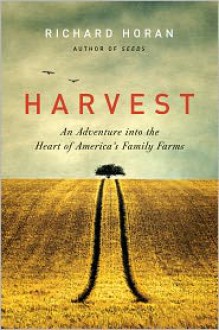 Sarah L. Courteau Reviewed Richard Horan's "Harvest: An Adventure Into The Heart Of America’s Family Farms" | The New Republic
Sarah L. Courteau Reviewed Richard Horan's "Harvest: An Adventure Into The Heart Of America’s Family Farms" | The New Republic: It's worth reading.
If you really want to start a food fight leading to extraordinary vitriole, just mention you are for (or against) organic food, raw milk, GMO, veganism, or whatever. So it's with some trepidation I link to this review in the New Republic about Richard Horan's new book. As someone who at one time in his life milked over 100 cows twice a day for several years, and who now lives surrounded by several 1,000 + acre farms (all family owned), I know that things are not quite as simple as the advocates of both sides would have us believe. (Full disclosure: I really, really like big farm machinery - see my photos.)
Ironically, this is an argument that can occur only among those who never have to worry where their next meal comes from. Those who are hungry can't afford to be picky and would be more than happy with road-kill. When anti-GMO types condemn and prevent "Golden Rice" from being introduced, a product that has the potential solve a serious vitamin deficiency where rice is a major staple (
http://www.gatesfoundation.org/agriculturaldevelopment/Pages/enriching-golden-rice.aspx) I think we need to reexamine our self-righteous arrogance.
From the review: "Unfortunately, personality and politics get in the way of Horan’s good intentions. The resulting book says a lot about what is wrong with today’s food crusaders—and I distinguish these from the many thoughtful and hard-working people, some of whom are sketchily profiled in Horan’s book, who are trying to help re-balance a food system that is severely out of whack. Our food choices matter, but the food crusaders are so intent on preaching their gospel that they have developed withering scorn for anyone whose answer to the question “What’s for dinner?” differs from theirs.... "But many organic and local-foods proponents assume that they have already attained a moral victory, and everyone who buys conventional stuff can go to hell. A study published earlier this year in the journal
Social Psychological and Personality Science** found that exposure to organic foods actually makes people less altruistic. Subjects in three different groups were shown pictures of foods labeled organic (like apples and spinach), comfort foods (like ice cream and brownies), or neutral-seeming control foods (mustard, rice, oatmeal). Afterward, participants who saw the organic foods were willing to spend less time helping a stranger in need, and their judgments of moral transgressions were significantly harsher than those who viewed the other foods. The comfort food group was the most generous. Someone please pass me the double chocolate chip."
From an
article about the Social Psychological study***: "
The findings are especially interesting when considered hand in hand with previous studies, including a 2010 paper in the journal Psychological Science titled "Do Green Products Make Us Better People?" It found that when people feel morally virtuous about purchasing green or organic products, they sometimes experience a "licensing [of] selfish and morally questionable behaviour," otherwise known as "moral balancing" or "compensatory ethics." The 2010 study suggests that such a "halo of green consumerism" makes people less likely to be kind to others, and more likely to cheat and steal."
Note that I'm not sure it's fair to go after those who prefer to eat organic food for feeling morally superior since the same kind of arrogance is obvious in those who ride bicycles, don't drink (that's me I'm afraid,) exercise, own guns, belong to a church, or indulge in any kind of behavior that permits them to create their own little tribe of morally superior adherents. Then again, perhaps this feeling of moral superiority is endemic to Americans, many of whom descended from those little Puritan shits.
**Wholesome Foods and Wholesome Morals? Organic Foods Reduce Prosocial Behavior and Harshen Moral Judgments. Social Psychological and Personality Science, first published on May 15, 2012
***Do Green Products Make Us Better People? Psychological Science February 2010 , first published on March 5, 2010 (subscription or purchase required, but if you want a pdf copy send me an email and I'll forward one along to you.)


 Log in with Facebook
Log in with Facebook 






![Dexter's Final Cut[DEXTERS FINAL CUT][Paperback] - JeffLindsay Dexter's Final Cut[DEXTERS FINAL CUT][Paperback] - JeffLindsay](http://booklikes.com/photo/max/220/330/upload/books/b/d/bdbde3aaa3eacebfcb64aa1a7ef3f114.jpg)








